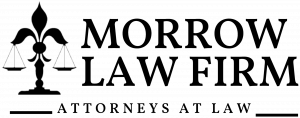— John Michael Morrow, Jr.
OPELOUSAS, LA, UNITED STATES, October 2, 2024 /EINPresswire.com/ — With the rise of rideshare services such as Uber and Lyft, the legal landscape surrounding vehicle accidents in Louisiana has evolved. Rideshare accidents bring unique challenges when it comes to determining liability and compensation for injuries or property damage. Understanding the legal rights of drivers, passengers, and third parties involved in rideshare accidents is critical in navigating the claims process and ensuring proper resolution. John Michael Morrow, Jr., a lawyer at Morrow Law Firm in Opelousas, Louisiana, offers insights into the legal considerations specific to rideshare accidents.
Morrow Law Firm, led by William P. Morrow, John Michael Morrow, Jr., and Stephen M. Morrow, focuses on workplace injury cases and also provides legal representation in motor vehicle accident claims.
The Unique Legal Status of Rideshare Accidents
Rideshare accidents differ from typical car accidents due to the unique relationship between the driver, the rideshare company, and the passenger. Unlike traditional taxi services, rideshare drivers operate as independent contractors, which can make determining liability more complex. Both Uber and Lyft have specific insurance policies in place that may provide coverage depending on the driver’s status at the time of the accident.
Rideshare accidents can involve:
Passengers: Individuals who are injured while using the rideshare service.
Drivers: Rideshare drivers who are either at fault or not at fault in the accident.
Third Parties: Pedestrians, cyclists, or drivers of other vehicles impacted by a rideshare accident.
“The status of the rideshare driver at the time of the accident plays a significant role in determining liability and the applicable insurance coverage,” explains John Michael Morrow, Jr. Coverage can vary depending on whether the driver is actively transporting a passenger, en route to pick up a passenger, or simply logged into the app without an active ride request.
Insurance Coverage for Rideshare Accidents
Rideshare companies like Uber and Lyft generally provide insurance coverage for their drivers, passengers, and third parties involved in an accident, but the coverage depends on the driver’s activity at the time of the collision. The different coverage scenarios include:
App Logged Off: When the rideshare driver is not logged into the app, the company’s insurance may not apply. In this scenario, the driver’s personal auto insurance policy is likely the only coverage available for any resulting damages or injuries.
App Logged In, No Active Ride Request: If the driver is logged into the rideshare app but has not yet accepted a ride request, limited contingent liability coverage may be provided by the rideshare company.
En Route to Pick Up a Passenger or During an Active Ride: When a rideshare driver is either on their way to pick up a passenger or actively transporting a passenger, the rideshare company’s full commercial insurance policy typically applies.
Determining Fault and Liability
As with any car accident, determining fault is a critical step in resolving a rideshare accident claim. Louisiana is a fault-based state, meaning that the party responsible for causing the accident is liable for resulting damages. In a rideshare accident, fault can be attributed to one or multiple parties, including:
The rideshare driver,
Another motorist,
Pedestrians or cyclists,
Vehicle manufacturers in the case of defective equipment.
Comparative fault laws in Louisiana allow for liability to be shared among multiple parties based on their degree of fault. This means that compensation for damages is distributed according to the proportion of responsibility each party holds in causing the accident.
Steps to Take After a Rideshare Accident
For individuals involved in a rideshare accident, taking the proper steps immediately following the collision is essential for both safety and legal protection. Key actions to consider include:
Ensure Safety and Call for Help: Prioritize medical attention for any injuries and contact law enforcement to file a police report. A detailed report is vital for insurance and legal purposes.
Exchange Information: Obtain contact information, insurance details, and rideshare app information from all parties involved, including the rideshare driver, passengers, and any third parties.
Document the Scene: Take photographs of the accident scene, vehicle damage, and any visible injuries. Additionally, note the conditions of the road, traffic signs, and other factors that may have contributed to the accident.
Report the Accident to the Rideshare Company: Contact the rideshare company (such as Uber or Lyft) through their app or website to officially report the accident. This is important for activating the company’s insurance coverage.
Notify Insurance Providers: Report the accident to all relevant insurance carriers, including personal auto insurance and the rideshare company’s insurer.
Passengers and Third-Party Rights in Rideshare Accidents
Passengers and third parties involved in rideshare accidents have rights and potential claims to compensation for their injuries and losses. As a passenger in a rideshare vehicle, both the rideshare company’s insurance and the driver’s personal insurance may be available to cover medical expenses, property damage, lost wages, and pain and suffering.
Third parties, such as other motorists, pedestrians, or cyclists, also have legal rights to pursue compensation if they are injured or suffer property damage due to a rideshare accident. The applicable insurance coverage depends on the specific circumstances and fault determination in the accident.
Legal Considerations for Rideshare Drivers
Rideshare drivers face unique legal considerations when it comes to accidents. If a rideshare driver is at fault, their liability and potential financial responsibility will depend on the status of the ride and the available insurance coverage. Even when the rideshare company’s commercial insurance applies, rideshare drivers may face deductibles and exclusions that affect their coverage.
If a rideshare driver is injured in an accident caused by another party, they may have a personal injury claim against the at-fault party. Navigating these claims can be complicated, particularly when multiple insurance policies and parties are involved.
Conclusion
Rideshare accidents in Louisiana involve unique legal and insurance considerations. Determining liability, understanding the status of the driver, and navigating the claims process are crucial for anyone involved in a rideshare accident, whether as a driver, passenger, or third party. Legal guidance can assist in ensuring that rights are protected and that proper compensation is pursued.
Morgan Thomas
Rhino Digital, LLC
+1 504-875-5036
email us here
Visit us on social media:
Facebook
Legal Disclaimer:
EIN Presswire provides this news content “as is” without warranty of any kind. We do not accept any responsibility or liability
for the accuracy, content, images, videos, licenses, completeness, legality, or reliability of the information contained in this
article. If you have any complaints or copyright issues related to this article, kindly contact the author above.
![]()
Originally published at https://www.einpresswire.com/article/748410328/understanding-legal-rights-in-rideshare-accidents-in-louisiana





